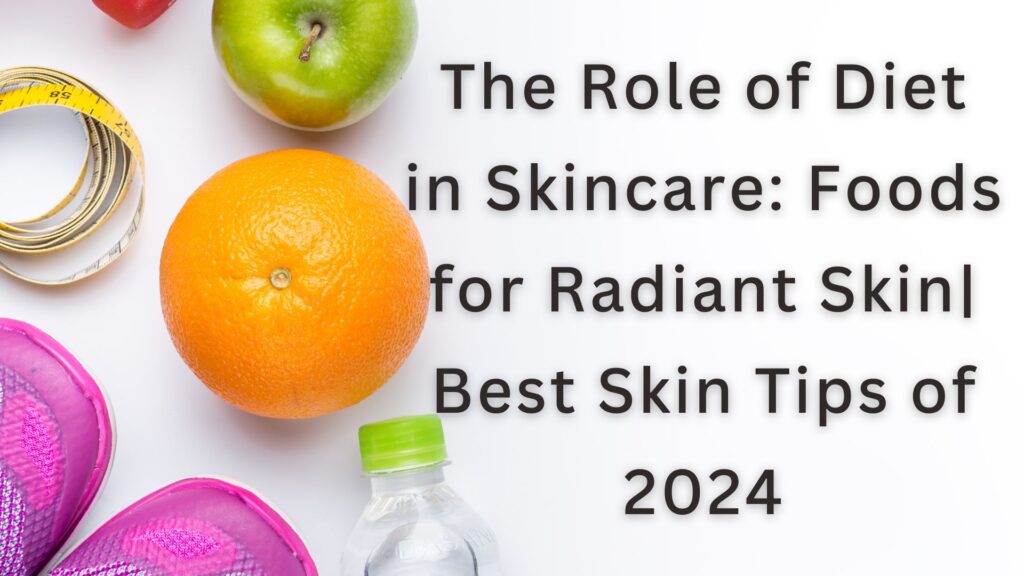Introduction
Achieving glowing, healthy skin is a common goal, but many people overlook the powerful role that diet plays in skincare. The foods we consume not only fuel our bodies but also provide essential nutrients that can significantly impact the appearance and health of our skin. Incorporating specific “foods for radiant skin” into your diet can lead to noticeable improvements in skin texture, tone, and overall vitality.
Table of Contents
Understanding the Connection Between Diet and Skin Health
Before diving into the specific foods for radiant skin, it’s essential to understand how diet influences skin health. Our skin is the largest organ in the body, and it requires a range of vitamins, minerals, and antioxidants to function optimally. Poor nutrition can lead to various skin issues, including dryness, acne, premature ageing, and dullness.
The skin reflects what’s going on inside the body. For example, inflammation caused by poor diet can manifest as acne or eczema. Similarly, nutrient deficiencies can lead to signs of ageing, such as wrinkles and fine lines. Therefore, a balanced diet rich in skin-friendly foods is crucial for maintaining a radiant complexion.
Top Foods for Radiant Skin
1. Fatty Fish
Fatty fish like salmon, mackerel, and sardines are excellent foods for radiant skin. They are wealthy in omega-3 unsaturated fats, which are fundamental for keeping up with skin wellbeing. Omega-3 fatty acids help keep the skin thick, supple, and moisturised. A deficiency in these fats can cause dry skin.
Additionally, the anti-inflammatory properties of omega-3s can help manage conditions like acne and psoriasis. Fatty fish also provide vitamin E, an important antioxidant that protects the skin from free radical damage, and high-quality protein, which is necessary for the production of collagen and elastin.
2. Avocados
Avocados are a fantastic source of healthy fats and are incredibly beneficial for skin health. They are packed with vitamins E and C, which are crucial for maintaining skin health. Vitamin E is an antioxidant that helps protect the skin from oxidative damage, while vitamin C is essential for collagen synthesis.
The healthy fats in avocados also help to keep the skin moisturised and flexible. Including avocados in your diet can lead to a more hydrated and supple complexion.
3. Walnuts
Walnuts are another excellent food for radiant skin. They are more extravagant than most different nuts in both omega-3 and omega-6 unsaturated fats. This balance of fatty acids is crucial for combating inflammation and ensuring the skin remains moisturised.
Walnuts also provide small amounts of zinc, a mineral essential for skin function. Zinc is necessary for wound healing, combating bacteria and inflammation, and maintaining overall skin health.
4. Sweet Potatoes
Sweet potatoes are a great source of beta-carotene, a nutrient that can convert into vitamin A in the body. Beta-carotene goes about as a characteristic sunblock, shielding the skin from UV harm. This protection helps prevent sunburn, cell death, and dry, wrinkled skin.
Eating sweet potatoes can give your skin a warm, orange hue, which can contribute to a healthier, more radiant appearance. Furthermore, they are rich in vitamins C and E, both of which are vital for maintaining skin health and appearance.
5. Red and Yellow Bell Peppers
Ringer peppers are a brilliant wellspring of beta-carotene and L-ascorbic acid. Vitamin C is necessary for creating collagen, the protein that keeps skin firm and strong. A diet high in vitamin C can help reduce the risk of dry skin and wrinkles.
Beta-carotene, like that in sweet potatoes, helps protect the skin from sun damage and gives it a natural glow. Including bell peppers in your diet can therefore help enhance skin health and radiance.
6. Broccoli
Broccoli is brimming with numerous nutrients and minerals significant for skin wellbeing, including zinc, vitamin A, and L-ascorbic acid. It also contains lutein, a carotenoid that works similarly to beta-carotene, protecting the skin from oxidative damage, which can cause skin to become dry and wrinkled.
Moreover, broccoli contains sulforaphane, a compound that may help prevent skin cancer and protect against sunburn. Sulforaphane neutralises harmful free radicals and activates other protective systems in the body.
7. Tomatoes
Tomatoes are an excellent source of vitamin C and all of the major carotenoids, including lycopene. Lycopene has been shown to protect the skin against damage from the sun and may help prevent wrinkling.
Eating foods rich in carotenoids, such as tomatoes, may help protect the skin from sun damage and improve overall skin health. Additionally, the combination of vitamin C and carotenoids can help maintain firm and youthful skin.
8. Soy
Soy contains isoflavones, which have been shown to improve skin health, particularly in middle-aged women. Isoflavones can mimic oestrogen in the body, which helps to maintain skin elasticity and moisture.
Regular consumption of soy can reduce fine lines and wrinkles, improve skin elasticity, and boost collagen production. These benefits make soy a valuable food for maintaining radiant, youthful skin.
9. Dark Chocolate
Dark chocolate is rich in antioxidants, specifically flavonoids, which can help protect the skin from sun damage and improve blood flow to the skin. These antioxidants can help reduce roughness and scaling on the skin, keeping it hydrated and smooth.
However, it’s important to choose dark chocolate with at least 70% cocoa to maximise the skin benefits. Lower sugar content is also beneficial as sugar can contribute to skin ageing through a process called glycation.
10. Green Tea
Green tea is packed with antioxidants that can protect the skin against damage and aging. The most powerful of these antioxidants is EGCG (epigallocatechin gallate), which has been shown to protect the skin from sun damage, reduce redness, and improve hydration, elasticity, and thickness of the skin.
Regular consumption of green tea can lead to significant improvements in skin health, making it a superb addition to a diet focused on achieving radiant skin.
Integrating Skin-Healthy Foods Into Your Diet
To maximise the benefits of these foods for radiant skin, it’s essential to incorporate them into a balanced diet consistently. Here are some practical tips:
Include a variety of colourful fruits and vegetables: Aim to fill half your plate with fruits and vegetables at every meal. This ensures a wide range of nutrients beneficial for skin health.
Pick solid fats: Select wellsprings of sound fats like avocados, nuts, seeds, and greasy fish. These fats are crucial for maintaining skin moisture and elasticity.
Stay hydrated: Drinking plenty of water is vital for keeping the skin hydrated. Supplement your water intake with hydrating foods like cucumbers and watermelon.
Limit processed foods and sugar: Processed foods and high sugar intake can lead to inflammation and breakouts. Focus on whole foods to promote clear, healthy skin.
Balance your diet: Ensure you’re getting a mix of protein, healthy fats, and carbohydrates. Each macronutrient plays a role in maintaining skin health.
Lifestyle Factors Affecting Skin Health
In addition to diet, several lifestyle factors can impact skin health. Here are a few to consider:
Regular Exercise: Exercise increases blood flow, which helps nourish skin cells and keep them vital. Sweating also helps cleanse the skin of impurities.
Adequate Sleep: Lack of sleep can lead to increased stress hormones, which may contribute to skin issues such as acne. Aim for 7-9 hours of sleep per night to allow your skin to repair and regenerate.
Stress Management: Chronic stress can negatively affect your skin. Procedures like contemplation, yoga, and profound breathing can assist with overseeing feelings of anxiety.
Avoid Smoking and Excessive Alcohol Consumption: Both smoking and excessive alcohol can dehydrate the skin and accelerate the ageing process. Limiting these habits can improve skin health.
Recommended Product
Foods for Radiant Skin
1. Organic India Virgin Coconut Oil
Benefits: Rich in healthy fats and antioxidants, great for cooking and as a topical moisturiser.
2. Saffola Gold Cooking Oil
Benefits: A blend of rice bran oil and sunflower oil, high in antioxidants and vitamins.
3. Happilo Premium Raw California Almonds
Benefits: High in vitamin E and healthy fats, excellent for snacking.
4. Yoga Bar Multigrain Energy Bars
Benefits: Packed with nuts, seeds, and grains, providing essential nutrients for skin health.
5. Farmley Premium Raw Walnuts
Benefits: Rich in omega-3 fatty acids and antioxidants, beneficial for skin health
Supplements for Radiant Skin
1. WOW Skin Science Omega-3 Fish Oil Triple Strength 1000mg Capsules
Benefits: High in EPA and DHA, supports skin hydration and elasticity.
2. HealthKart HK Vitals Vitamin E Capsules
Benefits: Antioxidant properties, supports skin health and prevents oxidative damage.
3. Carbamide Forte Triple Strength Omega-3 Fish Oil
*Benefits:** Provides essential fatty acids that help maintain skin moisture and reduce inflammation.
Skincare Products
1. Mamaearth Vitamin C Face Wash with Vitamin C and Turmeric
Benefits: Brightens skin, reduces pigmentation, and fights free radical damage.
2. Neutrogena Hydro Boost Water Gel
Benefits: Provides intense hydration, making skin look smooth and radiant.
3. The Face Shop Rice Water Bright Cleansing Foam
Benefits: Gently cleanses and brightens the skin, suitable for all skin types.
4. Plum Green Tea Clear Face Mask
Benefits: Helps control acne, reduces oiliness, and leaves skin fresh and glowing.
Herbal Teas
1. Organic India Tulsi Green Tea
Benefits: Rich in antioxidants, helps detoxify the body and improve skin health.
2. VAHDAM Chamomile Green Tea
Benefits: Soothes and calms the skin, rich in antioxidants.
Superfoods
1. True Elements Raw Chia Seeds
Benefits: High in omega-3 fatty acids, fiber, and antioxidants, great for skin health.
2. Neuherbs Raw Unroasted Flax Seeds
Benefits: Rich in omega-3 fatty acids and antioxidants, supports skin hydration and elasticity.
Fresh Produce
1. Zucchini (courgette)
Benefits: Low in calories, high in antioxidants, and vitamins C and A.
2. Sweet Potatoes from BigBasket
Benefits: High in beta-carotene, which is converted to vitamin A, promoting healthy skin.
3. Bell Peppers from BigBasket
Benefits: Rich in vitamin C and beta-carotene, supports collagen production.
Conclusion
Achieving radiant skin is not just about the products you apply externally but also about nourishing your body from the inside out. Incorporating a variety of nutrient-rich foods into your diet can lead to significant improvements in skin health and appearance. By focusing on the top foods for radiant skin, such as fatty fish, avocados, walnuts, sweet potatoes, and green tea, you can enhance your skin’s vitality and achieve a glowing complexion. Remember, consistency is key, and combining a healthy diet with positive lifestyle choices will yield the best results for radiant, youthful skin.
FAQs on The Role of Diet in Skincare: Foods for Radiant Skin
1. How quickly can I expect to see improvements in my skin after changing my diet?
Improvements in skin health from dietary changes can vary depending on the individual and the specific changes made. Generally, you may start noticing initial changes within a few weeks, but more significant results, such as improved texture and reduced acne, may take a few months of consistent, healthy eating.
2. Can supplements replace foods for radiant skin?
While supplements can help fill nutritional gaps, they should not replace whole foods. Whole foods provide a complex array of nutrients, fibre, and antioxidants that work synergistically to promote skin health. Supplements should complement a balanced diet rather than serve as a primary source of nutrients.
3. Are there any foods I should avoid for better skin?
Yes, certain foods can negatively impact your skin. These include:
Processed and fried foods: They can cause inflammation and breakouts.
Sugary foods and drinks: High sugar intake can lead to glycation, which damages collagen and accelerates ageing.
Dairy products: For some individuals, dairy can trigger acne.
4. How much water should I drink for healthy skin?
The general recommendation is to drink about 8 glasses (64 ounces) of water per day. However, individual needs can vary based on factors such as activity level, climate, and overall health. Staying adequately hydrated helps maintain skin moisture and can improve its appearance.
5. Can certain diets harm my skin?
Yes, extreme diets or those lacking in essential nutrients can harm your skin. Diets that are too restrictive, such as those very low in fats or devoid of certain food groups, can lead to deficiencies that affect skin health. A balanced, varied diet is key to maintaining radiant skin.
6. Is there a link between gut health and skin health?
Yes, there is a significant link between gut health and skin health. An unhealthy gut can lead to inflammation, which may manifest as skin issues like acne, eczema, and rosacea. Consuming probiotics and a diet rich in fibre can promote a healthy gut microbiome, benefiting your skin.
7. Are there specific foods that help with acne?
Certain foods can help manage acne, including:
Omega-3 rich foods: Such as fatty fish and walnuts, which reduce inflammation.
Antioxidant-rich foods: Like berries and green leafy vegetables, which protect against oxidative stress.
Low glycemic index foods: Such as whole grains and legumes, which help regulate blood sugar levels.
8. Can eating oily foods cause oily skin?
Eating oily foods does not directly cause oily skin. Skin oil production is largely influenced by hormones and genetics. However, a diet high in unhealthy fats (trans fats and saturated fats) can contribute to inflammation and other skin issues.
9. How does alcohol consumption affect skin?
Excessive alcohol consumption can dehydrate the skin, making it look dry and dull. It can also dilate blood vessels, leading to redness and broken capillaries. Reducing alcohol intake can help improve skin hydration and overall appearance.
10. Is coffee bad for my skin?
Moderate coffee consumption is generally not harmful to skin and may even provide antioxidant benefits. However, excessive caffeine can lead to dehydration, which can make your skin appear dull and dry. Balance coffee intake with plenty of water and a nutritious diet.




Usually I do not read article on blogs, however I would
like to say that thks write-up very compelled me to take a look at
and do so! Your writing taste has been amazed me. Thank you,
very nice article. https://bandur-Art.blogspot.com/2024/08/the-ultimate-guide-to-no-mans-sky-mods.html
Usuzlly I do not read artice on blogs, however I would like to say
that thijs write-up very compelled me to
take a look at and doo so! Your writing taste has been amazed me.
Thank you, very nice article. https://bandur-Art.blogspot.com/2024/08/the-ultimate-guide-to-no-mans-sky-mods.html